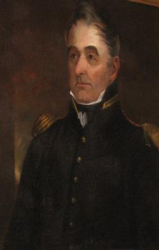
 |
|
|
||
|
James Winchester |
||||
|
Engagements: • Revolutionary War (1775 - 1783)• War of 1812 |
||||
| Biography: | ||||
|
James Winchester James Winchester was born on 6 February 1752 in Carroll County, MD. Winchester enlisted in the Maryland militia during the American Revolution. He served Gen. Hugh Mercer's Flying Camp Battalion during the early months of the war. He was captured by British forces during Gen. John Sullivan's failed attempt to take Staten Island on 22 August 1777. Winchester was released in a prisoner exchange, and in May 1778, he was commissioned a Lieutenant in the 3rd Maryland Regiment. He was taken prisoner a second time at the surrender of Charlestown, SC, on 12 May 1780. Exchanged in December, he was promoted to Captain and served the remainder of the war under Gen. Nathanael Greene. Life in Tennessee In 1785, Winchester moved to what is now central Tennessee, then a frontier district of North Carolina. He became an officer in the militia and eventually was promoted to Brigadier General. Following Tennessee's admission to the Union in 1796, Winchester was elected to its first Tennessee General Assembly serving in the Tennessee State Senate. In 1802, he completed the construction of his plantation home, Cragfont. War of 1812 In March 1812, three months before the war with Britain began, Winchester was commissioned a Brigadier General in the U.S. Army. When the hostilities started, he was placed in command of the Army of the Northwest, composed of several regiments then camped near Cincinnati. However, a conflict over command resulted in Gen. William Henry Harrison taking charge of Winchester's forces in an expedition against Fort Wayne, by virtue of Harrison's militia commission from Kentucky. Winchester's seniority was confirmed in September, but he was forced to relinquish command several days later when Harrison was commissioned a Major General in the Regular Army. Later that month, Winchester commanded one wing of Harrison's advance to Fort Defiance. After engaging in several skirmishes with British and Native American forces, he camped at the Maumee Rapids (present day Toledo, OH) in December 1812. River Raisin Massacre Early in 1813, Winchester took part in an attempt to recapture Frenchtown (present day Monroe, MI). On 18 January, his men drove off a smaller Canadian and Indian force and recaptured the American town. However, his men were attacked four days later by a combined British/Indian/Canadian force under Col. Henry Procter in the Battle of Frenchtown. Winchester himself was captured by Roundhead while trying to reach his men. Following the loss of hundreds of his soldiers in the initial assault, he agreed to order a conditional surrender of the remainder of his troops in exchange for "a pledge of protection." Despite Procter's pledge, Indians accompanying the British slaughtered 68 seriously wounded American soldiers in the Massacre of the River Raisin. Winchester was imprisoned in Canada for more than a year. He was released in a prisoner exchange and assigned to command the District of Mobile. After the war's end, he resigned his regular commission in March 1815 and returned home to Tennessee. Post-War Years In 1819, Winchester served on the state commission to regulate the Tennessee-Missouri boundary. Along with Andrew Jackson and John Overton, he founded the city of Memphis, TN, on 22 May 1819. Death and Burial Brigadier General James Winchester died on 26 July 1826 in Gallatin, TN, at the age of 74. He is buried at Winchester Cemetery at Gallatin. |
||||
| Honoree ID: 3235 | Created by: MHOH | |||
Ribbons
Medals
Badges
Honoree Photos
 |  |  |
 |  |
 |


